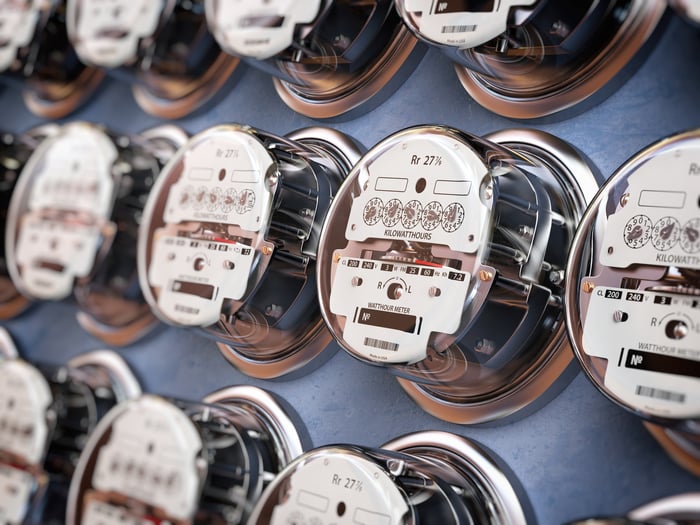There's little question that the coronavirus disease 2019 (COVID-19) pandemic has tested the resolve of investors like nothing before. Even though the peak-to-trough decline in the broad-based S&P 500 of 57% during the Great Recession is considerably higher than the peak decline of 34% during the COVID-19 pandemic, the big difference is that it took just 33 calendar days for the benchmark index to shed 34% due to coronavirus uncertainty.
While clearly worrisome, this panic-driven decline has opened the door for long-term investors to pick up high-quality companies on the cheap. Even though we may not know how long a bear market might last, what we do know is that, over the long run, time-tested businesses tend to increase in value.
In other words, this bear market is an opportunity to secure your financial freedom by putting your money to work in great businesses. Here are five top stocks that can help you in your quest for financial independence.

Image source: Getty Images.
Square
One recipe for financial freedom is to load your portfolio with companies that offer game-changing potential. In the financial technology space, that's Square (SQ -1.97%).
Even though Square is probably known best for its efforts to provide a point-of-sale platform for small-and-medium-sized businesses, what's really interesting about its operating results is that it's attracting a larger clientele to its seller ecosystem, based on annualized gross payment volume (GPV). Larger businesses can pack a bigger punch on the GPV front and really supercharge Square's fee-based growth.
What's more, Square's Cash App has all the makings of a payment disruptor. Between the end of 2017 and 2019, active member count more than tripled to 24 million, with average revenue per user more than doubling. With users able to transfer money, use their Cash Card to access money in their account, and even invest directly from their Cash App account, the growth possibilities are limitless.

Image source: Getty Images.
Intuitive Surgical
Within the healthcare space, I'd argue there's not a company on firmer ground than surgical system developer Intuitive Surgical (ISRG -0.41%).
For the past 20 years, Intuitive has been developing, manufacturing, and installing its da Vinci surgical systems in hospitals and surgical centers around the world. With 5,669 systems installed, as of March 31, 2020, Intuitive Surgical has a virtually insurmountable lead over its peers, and has become the default go-to for surgically assisted systems.
But what's really attractive about Intuitive Surgical is its razor-and-blades business model. You see, the da Vinci system (the "razor"), while pricey at $0.5 million to $2.5 million per machine, is costly to build, and therefore produces only so-so margins. The company makes most of its profit from selling instruments and accessories (the "blades") with each procedure, as well as in servicing these systems. As the number of installed systems grows, the percentage of revenue derived from these high-margin segments will rise, leading to superior profit potential.

Image source: Amazon.
Amazon
An absolute no-brainer for investors is to own the most dominant name in the retail space. That's why Amazon (AMZN -1.14%) easily makes the cut.
According to eMarketer, as of this past June, Amazon was on track to control 38% of all U.S. e-commerce in 2019. Chances are that the coronavirus pandemic has only further enhanced consumers' reliance on online ordering. Plus, with more than 150 million Prime members worldwide, Amazon is able to use those membership fees to modestly boost its generally thin retail margins, and ensure that it's undercutting brick-and-mortar retailers on price.
It's also important not to overlook Amazon's dominance as an infrastructure-as-a-service play. Amazon Web Services (AWS) has blossomed into a cloud infrastructure giant, with $41 billion in annualized sales, based on the $10.2 billion in revenue reported in the fiscal first quarter. Best of all, cloud margins are vastly superior to retail and advertising margins, meaning that as AWS becomes a larger percentage of total sales, Amazon's operating cash flow will skyrocket.

Image source: Getty Images.
U.S. Bancorp
Investors should also understand that boring businesses can be beautiful when it comes to securing their financial freedom. This is why money-center bank U.S. Bancorp (USB -0.20%) is such a smart buy.
Unlike many of its peers, U.S. Bancorp didn't get sucked into riskier derivative investment opportunities prior to the financial crisis more than a decade ago. As a result, it exited the Great Depression with a relatively clean balance sheet and was able to bounce back much faster than the rest of the banking industry. This is why its return on assets (i.e., the amount of profit U.S. Bancorp generates relative to its total assets) tends to be the best among large money-center banks.
U.S. Bancorp has also done an excellent job of cost-management over the past decade. Its operating results show that more of its members are using digital and mobile banking apps, which has allowed it to rein in costs by reducing its physical branch count. When it comes to big-bank efficiency, U.S. Bancorp and its 5% dividend yield stand alone.

Image source: Getty Images.
NextEra Energy
To really drive home the point about boring businesses playing a critical role in wealth creation, I'd strongly suggest investors consider adding electric utility NextEra Energy (NEE 0.34%) to their portfolios.
The most obvious benefit to utility stocks is the predictability of cash flow that they bring to the table. Regardless of how well or poorly the U.S. economy is performing, homeowners and renters still need and use electricity. Plus, NextEra's traditional utility operations are regulated, which is to say that it needs permission from state-level energy commissions to raise rates. This might sound like a nuisance, but it ensures NextEra avoids the potential volatility of wholesale electricity pricing.
But the real allure of NextEra Energy is the company's green initiatives. No company is generating more from wind or solar than NextEra, and that'll likely remain the case with the company setting aside billions for renewable energy projects. Though these projects aren't cheap, they're substantially lowering generation costs and electrifying NextEra's long-term growth rate. It also doesn't hurt that lending rates are near historic lows, which'll allow NextEra to push through cost-reducing green-energy projects in the years to come.





